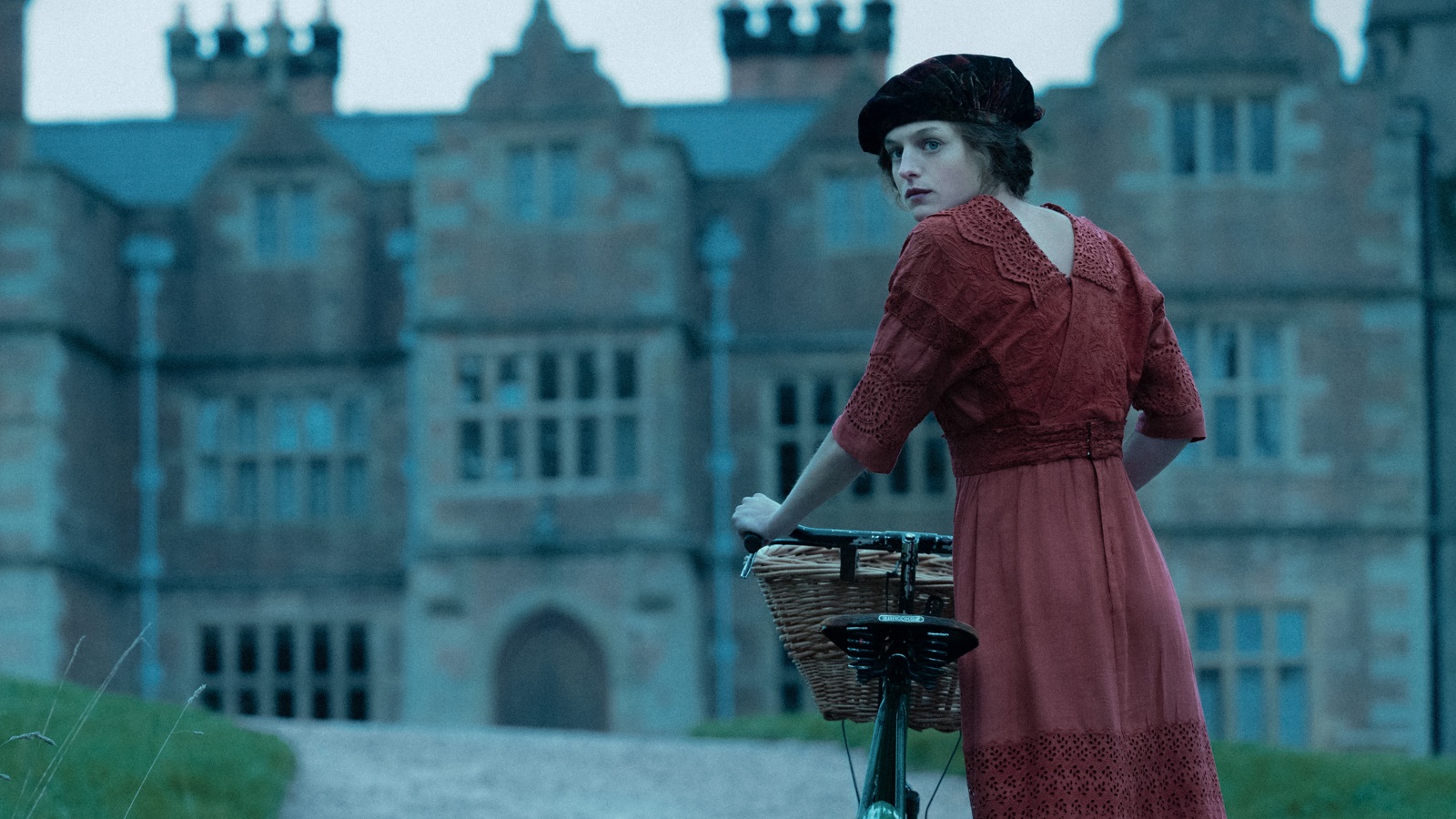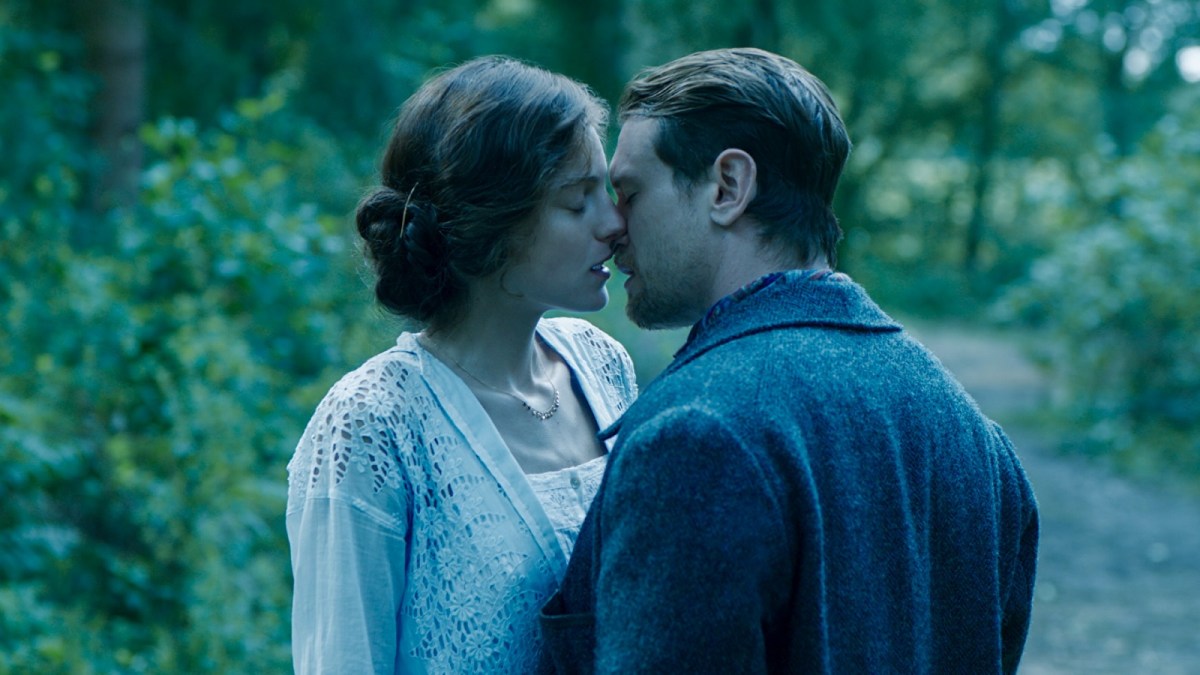Intellectual wealth over financial security defines this latest adaptation of 1929 novel Lady Chatterley’s Lover, as shaped by Oscar-nominated screenwriter David Magee (Finding Neverland). Lush open woodlands and expansive family estates form a backdrop to this tale of inherent class divide and forbidden passion from author D.H. Lawrence.
Directed by Laure de Clermont-Tannerre and starring Emma Corrin (The Crown) as Lady Constance Chatterley, this post-war period piece delves into familiar territory. Having returned from active duty at the front line with lifelong injuries, Clifford Chatterley (Matthew Duckett) is now wheelchair-bound and confined to his stately pile. Prior to his departure, a truncated yet extravagant wedding reception signified his marriage to Constance, and the beginning of their life together.
In these rose-tinted segues, the director revels in soft focus photography, whilst alluding to past infidelities as Corrin leans into the coquettish nature of this literary creation. Thematically this is a standard adaptation which embraces the notion of post-traumatic stress, class division and industrial expansion – exploring as it does the relationship between the gentrified landowner and his mining community, who provide him with status.

Both actors work hard to establish a solid chemistry early on, which feeds into the emasculation that comes with Clifford’s war injury, his acceptance of which is illustrated through the proposition he puts to Constance, granting her free reign to seek suitors and provide them with an heir. It’s a situation that not only gives this film its dramatic impetus, but also allows an exploration of attraction on a more intricate level.
When Oliver Mellors (Jack O’Connell) and Lady Chatterley first encounter each other, there is a respectful degree of decorum. Class divides are acknowledged, physical attractions ignored, and boundaries established. This is textbook period drama structuring pulled off with polish, flair and panache by all concerned. O’Connell is understated, Duckett equally reserved in his elitist buffoonery, while Corrin colors her portrayal of Constance with internalized sexual tension.
From there, it is a salacious game of cat and mouse, as Constance challenges convention and tempts fate by seeking out Oliver beyond their chance encounter. As a character, the gamekeeper exemplifies masculinity in every way that Clifford Chatterley does not, being both resourceful and inherently open about his desires. These two men also differ in their intellect; where one is driven by money and status, the other embraces more literary impulses alongside his more practical endeavors.

Cheated on by an ex-wife and hounded by her current lover for a share of his war pension, Oliver is ideologically at odds with Clifford as well. One holds stock in mechanization, progressive industry and overt capitalism, while the other embraces more organic notions tending towards nature and the written word. This is the dichotomy which underpins Lady Chatterley’s Lover, as it revolves around a selection of universal truths concerning love, loss and conflict.
As for the infamous sex scenes which have caused ripples in every other incarnation, there is an urgency about them which thematically resonates beyond the copious coupling. Oliver and Constance are liberated from the confines of social expectations during their time in the woods. Cocooned by carnal desire and innocent of any aftermath, this connection is not only pivotal to the story, but crucial in defining those more tragic elements which happen as a result.
Needless to say, that tragedy comes calling as word of their behavior is spread by a vengeful outside party – a revelation which backs Clifford into a corner on every front. Stripped of his working wage, removed from the estate and confronted by his employer, Oliver remains dignified in the face of widespread ridicule and recrimination.
If there were any criticisms to be made of this adaptation, they would revolve around a lack of passion. Although the physical manifestation of lust feels real enough, drama beyond that frantic union is strangely lacking. Clifford is either a tyrant, an entitled idiot or an upper-class buffoon who rarely moves beyond those archetypes. That inherent lack of dramatic turbulence, which is only ever hinted at through some rare flashes of inventive symbolism, tempers what should have been a tumultuous relationship drama.
Instead, audiences are left with a perfectly passable piece of literary cinema, which is propped up by some committed performances from the principal players. Unfortunately, Lady Chatterley’s Lover circa 2022 fails to deliver the degree of bodice-ripping drama for which D.H. Lawrence adaptations are well known.










Published: Oct 16, 2022 04:44 am